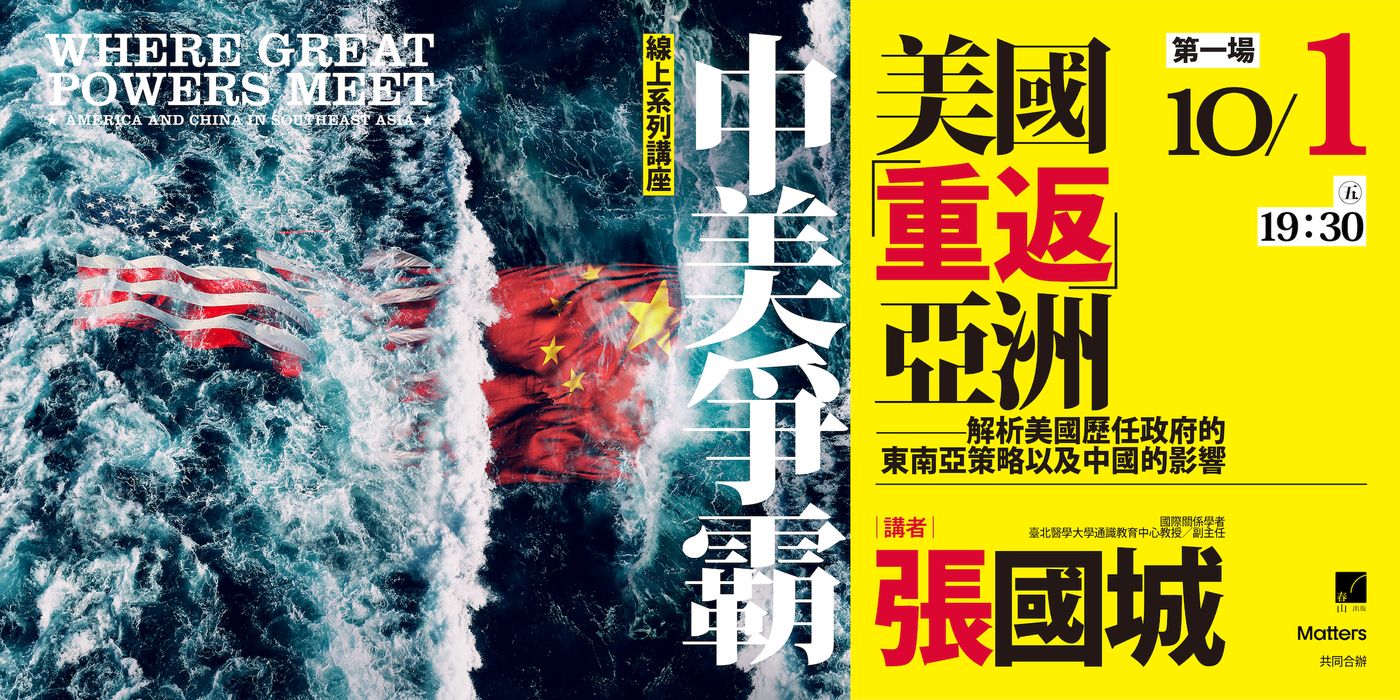Online Lecture: The United States’ “Return” to Asia─Analysis of the Southeast Asian strategies of successive U.S. administrations and China’s influence

[Online Lecture Series on Sino-US Hegemony] ►► Co-organized by Spring Mountain Publishing XMatters◄◄
〚The first game〛 10/1 (Friday) starts at 19:30
Speaker | Zhang Guocheng (International relations scholar, professor/deputy director of the General Education Center of Taipei Medical University)
Lecture Topic|The United States “returns” to Asia─analyzing the Southeast Asian strategies of successive U.S. administrations and China’s influence
Go to register https://bit.ly/3lQnhnV
►► Lecture Introduction◄◄
Shen Dawei described in "The Sino-U.S. Struggle for Hegemony: Two Powers Encounter in Southeast Asia" that the United States and Thailand signed a treaty of trade and friendship in 1833, which was the first formal bilateral treaty between the United States and a Southeast Asian country. However, in 1821, the United States also The Pacific Naval Squadron was established to operate along the coast of China. The United States has not been absent from Southeast Asia for nearly two hundred years. Not only was the Philippines a colony, but after World War II, Southeast Asia became one of the two major anti-communist battlefields in the world. The United States was also involved in the Vietnam War. Military cooperation between the United States and Southeast Asian countries continued after the Vietnam War. Go ahead, why did Obama call for "returning" to Asia after taking office in 2008? For successive U.S. administrations, especially with the Vietnam War as a watershed, how should they evaluate the Southeast Asian region? The active defensive response of the United States seems to be related to China's ten years of deep exploration in Southeast Asia after the 1997 financial crisis. How will the changes in the relationship between the United States and China be reflected in Southeast Asia? The United States and China are competing for global hegemony, but what are the different conditions in Southeast Asia?
►► Key points of the lecture◄◄
1. How does the United States view Southeast Asia in the long term? From before and after World War II to the present, how have successive U.S. governments competed for interests in Southeast Asia?
2. Shen Dawei used the term "ambivalent" or "airborne diplomacy" to describe the United States' long-term diplomatic approach in Southeast Asia. Is this the United States' usual diplomatic approach, or is it especially true in Southeast Asia?
3. What are the watersheds in the diplomatic, military, and economic aspects of the United States’ operations in Southeast Asia? How is the current Sino-US struggle for hegemony in Southeast Asia different from the Cold War in the past?
4. In what context was the Obama administration’s pivot to Asia or rebalancing strategy announced? Will there be continuity when the two major parties take turns in power?
5. How to evaluate the respective advantages and disadvantages of the United States and China in Southeast Asia today?
※Readers who want to participate are welcome to ask questions in the message area of this article first. We will collect the questions and the speakers will reply on the day of the online lecture.
[illustrate]
*This event will be held in zoom conference room
*Registration is required for this online event
*Readers who want to attend the lecture please fill in the registration information first
*Registration links will be sent out one after another after 3 pm on 9/30 (Thursday), and the registration link will be closed at 7 pm on 10/1 (Friday).
*Notification emails are likely to be viewed as spam by the system. Readers who have successfully registered are asked to pay more attention to their inboxes on 10/1 (Friday). If you have any questions, you can also send a private message to Chunshan on Facebook.
——–
►► Further reading◄◄
[Introduction by Cai Hongzheng] #Great Power Competition in Southeast Asia
Full text https://bit.ly/3kxGJX3
[Introduction by Zhuang Jiaying] #是什么意思是什么意思, re-understand Southeast Asia's " #不选sided " strategy
Full text https://bit.ly/3o1iClK
【Jiang Huaizhe's Special Article】#Knowledge Production in Southeast Asia from the American Strategic Perspective
Full text https://reurl.cc/6DZDNM
Like my work? Don't forget to support and clap, let me know that you are with me on the road of creation. Keep this enthusiasm together!



- Author
- More